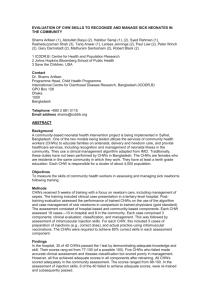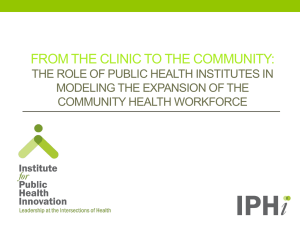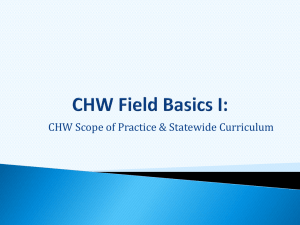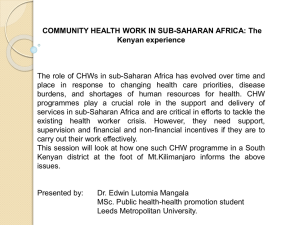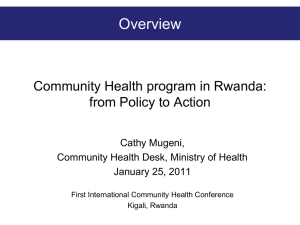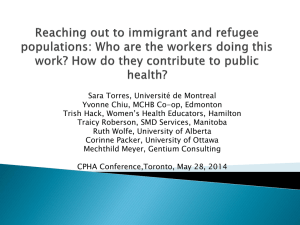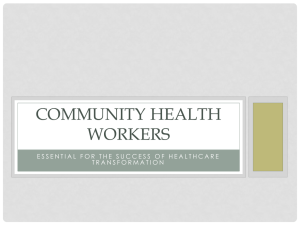CMHW 1000 The Community Health Worker Role
advertisement
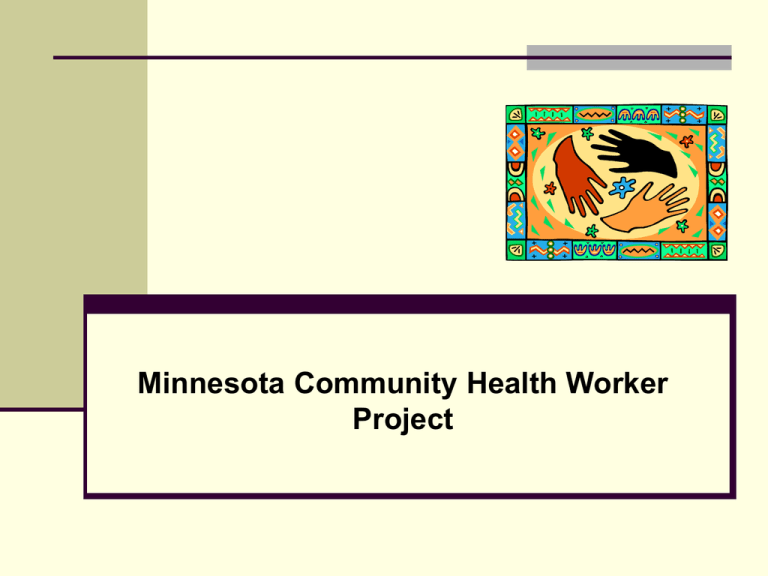
Minnesota Community Health Worker Project Presentation Objectives Development of Partnership Development of CHW Curriculum Development of Policy Role of CHWs in MN Project Outcomes Minnesota CHW Project A vision to create: A process to standardize the profession for CHWs. A standardized process for educating CHWs in MN through the MNSCU system. Curriculum is 11 credits including community based training and internship. A process for incorporating CHWs into the health care workforce by creating a sustainable employment market. MN CHW Partnership History MN Immigration Task Force under the Commissioner of Health BCBS Studies BCBS of MN Foundation Grant Robert Wood Johnson Grant Existing Curriculums National Movement Program Feasibility Study Two Studies by BCBS of MN Foundation www.bluecrossmn.com/public/foundation Critical Links: Study Findings and Forum Highlights on the Use of Community Health Workers and Interpreters in Minnesota — This report shares findings from a statewide employee survey and a forum in which policymakers, educators and representatives from health organizations met to discuss CHW inclusion in Minnesota's health care system. Critical Learning: Bicultural Community Health Workers’ Views on Prospective Training Opportunities — This report, prepared by the Wilder Foundation, describes bilingual CHWs opinions related to training needs of new and experienced community health workers. The information was collected from two focused discussions with CHWs in July 2003. Evaluation of Study Community health workers (CHWs) are important and highly valued in the delivery of culturally and linguistically appropriate health care to Minnesota's increasingly diverse populations CHWs serve as a crucial bridge between specific cultural groups and the health systems that serve them. Demand for CHWs is strong and will increase as diversity increases in the population. Employers and health and human services indicated that 66% would hire CHWs. Findings Continued Organizations face challenges in hiring and retaining CHWs and that training across the state varies. Over 90% of employers of CHWs in Minnesota state a need for standardized training. Organizations cite a shortage of qualified CHWs as a barrier to providing culturally and linguistically appropriate services Retention is a problem Employers indicated that standardized training would help ensure a better prepared CHW workforce and increase pool of qualified CHWs Findings Continued CHW participants in study felt that training was important Core skill building training in specific areas was very important CHWs felt training would validate the work they do and would help to receive recognition and respect from health care field. MnSCU- College and University Program Planning Study (cupps) MnSCU study completed before implementation of new program Shows the size of gap (labor shortage or surplus) in programming to meet state or regional occupational needs. Job seeker shows whether there is a current worker shortage or surplus Program planner study shows projected worker shortage or surplus Labor market information for report is supplied by MN Department of Employment and Economic Development. Partnership Development Two Committees Advisory Committee Developed curriculum Recruitment of students Community development of project Policy Council Advance the role of CHWs in public and private sectors Develop recommended strategies to incorporate CHWs into the workforce Make the CHW a reimbursable position CHW Curriculum Design Partnership Development Development Meetings January 2004 – July 2004 Curriculum Retreat 2-Day retreat involving 12 individuals: faculty, CHWs, Community Programs Curriculum Development Five Faculty finished curriculum MnSCU Dr. Sue Roe - consultant Curriculum – Sequence, Format, Level and Approach Structure and Delivery What core skills do CHWs desire Credits Financial Assistance Level of Proficiency Fieldwork/Internship Career Pathways Delivery of curriculum Admission Criteria Based on each individual program within MnSCU system High School or GED Fluent in a primary language Level of English Language Accuplacer Evaluation Specialized Admission references life experiences oral interview Class Composition Number of students in program Recommendation: 15-30 Determined by individual Colleges Training times Locations Faculty Licensing MnSCU 3.9 Licensure: A process for determining that the individual meets the minimum qualifications required for a license; the condition of being licensed Co-Facilitating CHWs Community Partners Cost MCTC - $129.53 Financial Aid SCTC - $117.75 Funding Sources Grant Funding Employer Supported Financial Aid Employer Supported Scholarships Curriculum CMHW 1000 The Community Health Worker Role: Advocacy and Outreach (3 credits: includes 48 hours of internship) This course focuses on the community health worker's personal safety, self-care, and personal wellness and on the promotion of health and disease prevention for clients. Course includes: classroom and internship field work. Curriculum Continued... CMHW 1015 Organization and Resources: Community and Personal Strategies (2 credits: includes 48 hours of internship) This course focuses on the community health worker’s knowledge of the community and the ability to prioritize and organize work. Emphasis is on the use and critical analysis of resources and on problem solving. Curriculum Continued… CMHW 1025 Community Health Worker’s Role in Teaching and Capacity Building ( 2 credits) This course focuses on the community health worker’s role in teaching and increasing the capacity of the community and of the client to access the health care system. Emphasis is on establishing healthy lifestyles and clients’ developing agreements to take responsibility for achieving health goals. You will learn about and practice methods for planning, developing and implementing plans with clients to promote wellness. Curriculum Continued… CMHW 1035 The Community Health Worker: Legal and Ethical Responsibilities (1 credit) This course focuses on the legal and ethical dimensions of the community health worker’s role. You will study the boundaries of the community health worker position, agency policies, confidentiality, liability, mandatory reporting and cultural issues that can influence legal and ethical responsibilities. Curriculum Continued… CMHW 1045 Community Heath Worker: Coordination, Documentation and Reporting (1 credit) This course focuses on the importance and ability of the community health worker to gather, document and report on client visits and other activities. The emphasis is on appropriate, accurate and clear documentation with consideration of legal and agency requirements. Curriculum Continued… CMHW 1055 Communication Skills and Cultural Competence (2 credits) This course provides the content and skills in communication to assist community health workers in effectively interacting with a variety of clients, their families and a range of healthcare providers. You will learn about communicating verbally and nonverbally, listening and interviewing, networking, building trust and working in teams. You will practice communication skills in the context of a community’s culture and the cultural implications that can affect client communication. Student Recruitment Project staff – Community Development Specialist Partners Peer Networking Group Advertise & Market: brochures, web, etc Work within communities, Adult Basic Education, workforce, educational systems, non-profits, resettlement programs Pilot Sites First Pilot Sites: Minneapolis Community and Technical College (urban) Contact: Carmen Franzmeier 612.659.6212 South Central Technical College (rural) Contact: Kellie Miller Nagel 507.389.7407 Future Pilot Sites: Available throughout MnSCU system which has campuses in 46 communities throughout MN Other Community or Technical Colleges Certificate Policy Development Advance the role of CHWs in public and private sectors Develop recommended strategies to incorporate CHWs into the workforce Develop sustainable funding of CHW positions (third party reimbursement, grants,etc.) Developed Partnership Charter CHW Project Partners BCBS Foundation of MN Otto Bremer Foundation RWJ – Local Initiative Minnesota Department of Health Health Partners Fairview St. Paul – Ramsey County Department of Health City of Mpls – Department of Health and Family Support Multicultural Healthcare Alliance Department of Human Services MN Nurses Association Region Nine Development Commission UCare of Minnesota Minnesota Hospital Association MnSCU University MN Area Health Education Center (AHEC) Indian Health Services MN Board of Nursing Open Door Health Center Neighborhood Health Care Network Minnesota International Health Volunteers Policy Council Meet Monthly Monthly state speakers Divided into subcommittees Payers/reimbursement Research/evaluation conference Business Case study and presentation Workforce Study on cost effectiveness of CHWs What is a Community Health Worker (CHW)? CHWs are paraprofessionals who are from the communities in which they work and help build trust around health at the grassroots level. They link community members to information and resources. CHWs: Help bridge the gap between cultures and the health care system. Help clients navigate the health care system and other community services to overcome access barriers. How does a CHW Work? CHWs serve as: Health information disseminators Advocates Facilitators Motivators Culture brokers Liaisons to resources Their overall goal is mentoring and engaging clients, health care systems, workforces, employers and communities at large to achieve positive outcomes and reach optimal levels of wellness. With Whom Do CHWs Work? CHWs are extenders of (supervised by): Social Workers Nurses (in clinical setting) Public Health Nurses Financial Assistance Program Staff Head Start Directors or Supervisors Community Based Organization Supervisors Different Job Titles Community Health Worker Community Health Representatives Promotoras Outreach Worker Family Resource Worker Community Health Specialist Health Advocate Community Advocate Doulas Peer Health Promoters CHW Employment Opportunities Health plans: Kaiser Hawaii employs CHWs to increase Medicaid enrollees’ access to preventive services. Some CHWs focus on managing high risk members who are pregnant or members with asthma or diabetes. Members utilized services more appropriately after CHW interventions. CHW Employment Opportunities Hospitals: Presbyterian Hospital (NY) created CHW positions to work with triage nurses in the ED. CHW arranged to re-route patients coming to the ED for non-emergent conditions to primary care appointments; educated about value of primary care; followed up with patients to determine satisfaction. Broken appointment rate dropped from 50% to 11% over 3 years. Became low users of ED. CHW Employment Opportunities Clinics: Wellness Connection Open Door International Clinic Fremont Clinic Neighborhood Healthcare Network Clinics Northpoint Health and Wellness Center Counties: Hennepin County Ramsey County CHW Employment Opportunities Community based organizations & businesses: Region Nine Development Commission’s Saludando Salud CAPI Veterans Home Council on Crime and Justice City of Minneapolis “Way to Grow” Centro Campesino Head Start Minnesota Department of Health Indian Health Services Sustainable Funding Models Reimbursement mechanisms from third party payers Letters of agreement between communitybased organizations and health care organizations for CHW services Medicaid Grants Other projects linked to MN CHW CHW supervisors Curriculum CHW Peer Network Two National Projects Community Health Worker National Education Collaboration through the University of Arizona Funded under a grant from Fund for the Improvement of Postsecondary Education (FIPSE) Project that brings together leaders in the CHW field to develop a consensus around “best practices” approaches to CHW education HRSA Community Health Worker National Workforce Study through the University of Texas at San Antonio Assessment Course Evaluation Student Survey Accuplacer evaluation Student post class focus group Faculty post class focus group Program Assessment Advisory Committee Policy Council Outcome Expectations Project Outcomes Appropriate care for everyone Increase trust between patient and provider Increase healthcare access Improve compliance in chronic disease Credit and confidence for new students into post secondary school Decrease disparities Diversify the workforce Make CHW a standardized position Legitimize CHW profession Increase CHW awareness in community CHW position reimbursable Question and Comments Contact Information Anne Willaert Minnesota State University Mankato 124 Myers Field House Mankato, MN 56001 507.389.2590 anne.willaert@mnsu.edu www.heip.org
